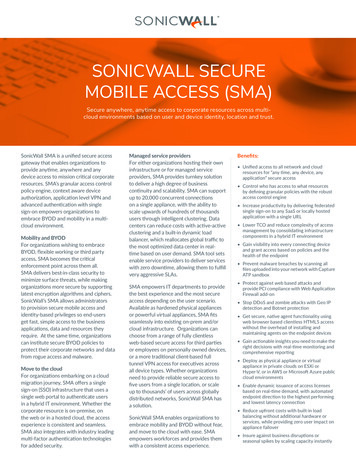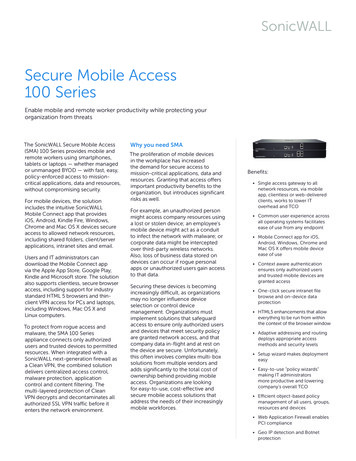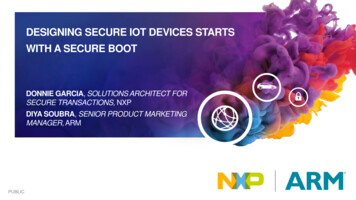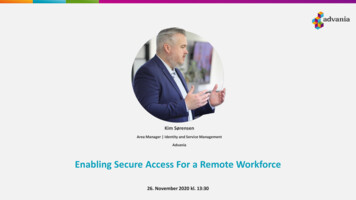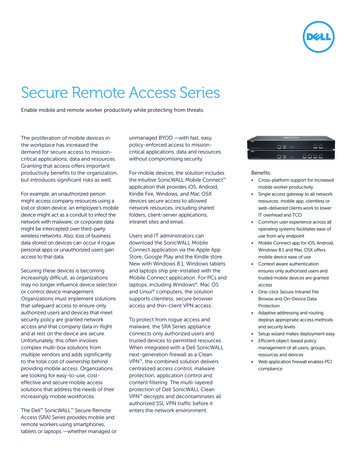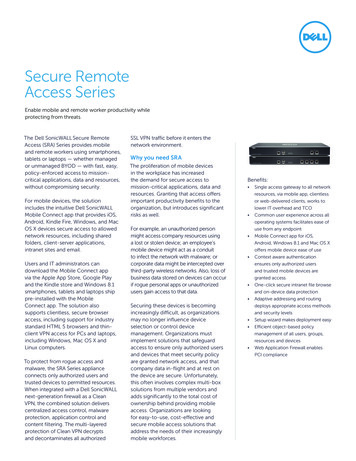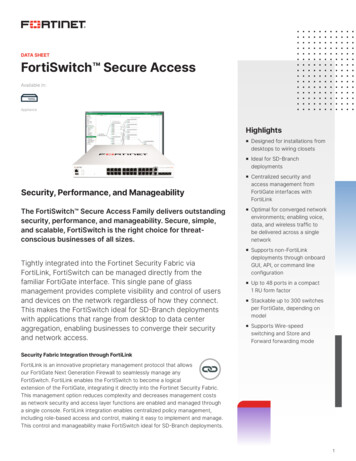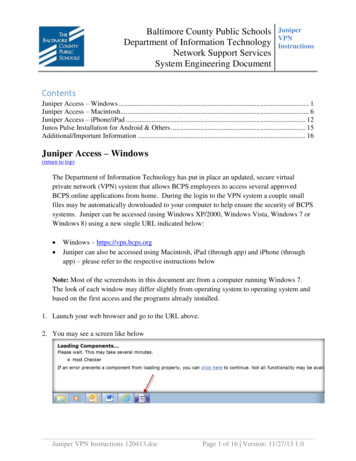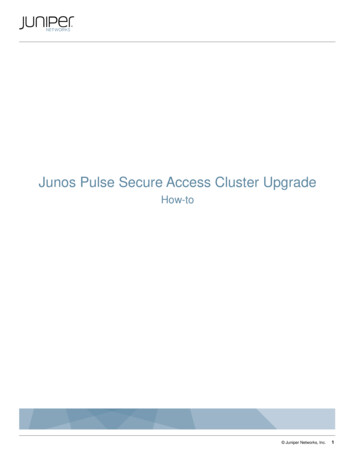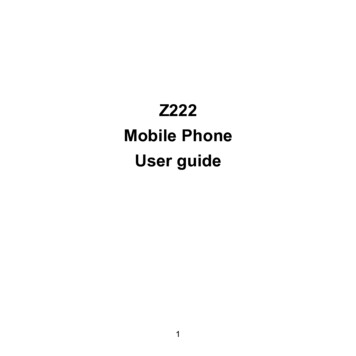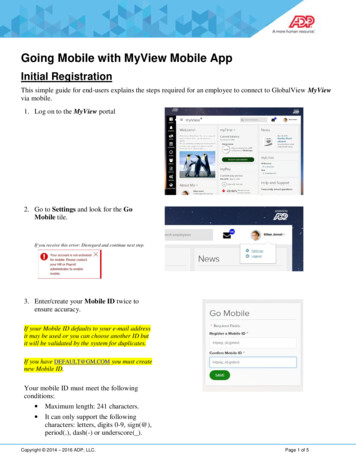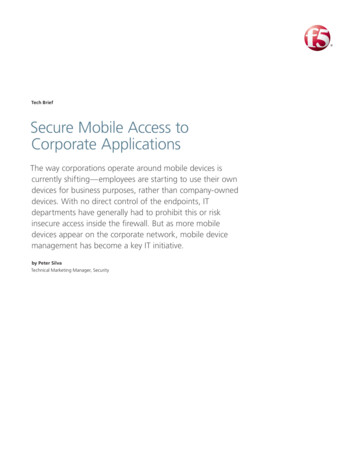
Transcription
Tech BriefSecure Mobile Access toCorporate ApplicationsThe way corporations operate around mobile devices iscurrently shifting—employees are starting to use their owndevices for business purposes, rather than company-owneddevices. With no direct control of the endpoints, ITdepartments have generally had to prohibit this or riskinsecure access inside the firewall. But as more mobiledevices appear on the corporate network, mobile devicemanagement has become a key IT initiative.by Peter SilvaTechnical Marketing Manager, Security
Tech BriefSecure Mobile Access to Corporate ApplicationsContentsIntroduction3Getting Down to Business3iOS and Android Devices with the BIG-IP System4F5 BIG-IP Edge Apps4Conclusion10References102
Tech BriefSecure Mobile Access to Corporate ApplicationsIntroductionMobile devices have become computers in their own right, with a huge array ofapplications, significant processing capacity, and the ability to handle highbandwidth connections. They are the primary communications device for many, forboth personal and business purposes.Many IT executives are planning to make internal business applications available toemployees from their smartphones or mobile devices. This goes beyond email andincludes CRM applications, ERP systems, and even proprietary in-house applications.Because personal mobile devices are so prevalent, many organizations are movingfrom corporate ownership of devices to allowing employees to use their own devicesfor business purposes. Some companies view this as a cost-saving measure, butidentifying these personal devices as legitimate endpoints is still a challenge,especially when it comes to security and compliance. In addition to smartphones,tablet devices like the Apple iPad and a whole new array of computing devices arerequesting access to corporate resources.The 2007 launch of the iPhone and the 2008 release of Android changed the waypeople perceive and use mobile devices. These devices aren’t just for the techsavvy—parents, celebrities, retailers, and everyone in between love to use theirsmartphones for personal purposes and for work. The first iPhone was missing afew important features that would have made it a business-capable device. But asnew generations hit the market and iOS matured, the iPhone became a viablebusiness device; plus, more and more consumers are choosing Android devices. This,combined with the trending ‘bring-your-own-device’ model in business, meansmore secure apps and ways to access content are a necessity.Getting Down to BusinessIT infrastructure and helpdesk staff have been inundated with requests to supportboth managed and unmanaged Apple iPads and iPhones and Android devices in thecorporate environment. With no direct control of the endpoints, IT has had to turnthese requests away to avoid risking insecure access inside the firewall. Mobiledevices, personal or not, have always presented a challenge to IT. Provisioning amobile device and determining which applications and services are allowed/enabledcan be daunting. Despite impressive computing power, a mobile device is not atraditional laptop or desktop, and functionality can differ greatly. Even mobile devicecapabilities vary based on make, model, and OS. Many IT organizations have solved3
Tech BriefSecure Mobile Access to Corporate Applicationssome of their security and compliance issues and now allow personal homecomputers to access business resources; providing access to personal mobile devicesis the next piece of the puzzle.Technologies like SSL VPN have made it easier for organizations to inspect the host,know its security posture, and allow a certain level of access based on those checks.With mobile platforms, it can be hard to determine if the latest patches are up todate, if it is free of malware, if it is free of otherwise unauthorized programs, and ifit abides by the corporate access policy. Different security policies may apply tomobile computing devices than to traditional devices. Can the corporation disablethe personal device if it is compromised and contains sensitive information?Mobile WorkforceIncreasingAccording to IDC, the worldwidemobile worker population is setto increase from 919.4 million in2008, accounting for 29 percentof the worldwide workforce, to1.19 billion in 2013, accounting for34.9 percent of the workforce.1If VPN access is allowed, IT must ensure the authentication and authorizationmechanisms are configured properly. There may also be issues with usage tracking,license compliance, and session persistence as users roam among various mobilenetworks. Many companies also use portals, proxies, and IDS/IPS to control access.Even GPS data could pose a risk to an organization, especially for government andmilitary deployments. Increased network traffic also needs to be monitored. Asmore employee-owned mobile devices appear on the corporate network, ITdepartments must make mobile device management a key initiative.iOS and Android Devices with theBIG-IP SystemBusiness users are increasingly looking to take advantage of both Apple iOS andAndroid devices in the corporate environment, and accordingly, IT organizations arelooking for ways to allow access without compromising security or losing endpointcontrol. Many IT departments that have been slow to accept personal mobiledevices are now looking for a remote access solution to balance the need for mobileaccess and user productivity with the ability to keep corporate resources secure.F5 BIG-IP Edge AppsF5 created two apps for Apple iOS and Android mobile devices: F5 BIG-IP EdgePortal and BIG-IP Edge Client . The iOS versions of BIG-IP Edge Client and BIG-IPEdge Portal are available at the Apple App Store, and the Android versions areavailable at Google Android Marketplace (North America) and the Samsung App1 Worldwide Mobile Worker Population 2009–2013 Forecast. IDC Doc #221309, December 2009.4
Tech BriefSecure Mobile Access to Corporate ApplicationsStore (international). There is also a version of the client for all Android 4.0 (IceCream Sandwich) devices.BIG-IP Edge PortalThe BIG-IP Edge Portal app for iOS and Android devices streamlines secure mobileaccess to corporate web applications that reside behind BIG-IP Access PolicyManager (APM) and BIG-IP Edge Gateway. With the BIG-IP Edge Portal app,users can access internal web pages and web applications securely.BIG-IP Edge Portal, in combination with customers’ existing BIG-IP Edge Gatewayand BIG-IP APM or FirePass SSL VPN deployments, provides portal access to internalweb applications such as intranet sites, wikis, and Microsoft SharePoint. This portalaccess provides a launch pad that IT administrators can use to allow mobile accessto specific web resources, but without risking full network access connections fromunmanaged, unknown devices. Mobile users can sync their email, calendar, andcontacts directly to the corporate Microsoft Exchange Server via the ActiveSyncprotocol. This solution also enables corporate IT to grant secure mobile access toweb-based resources.IT administrators can also create and manage layer 7 access control lists (ACLs) tolimit access to certain resources. For instance, administrators can specifically createwhite lists or blacklists of sites that users can access. Administrators can even specifya particular path within a web application, like /contractors or /partners. Based onthe device check and the authenticated user group, a user on that device would onlybe able to navigate to those assigned resource paths. Even if a contractor happensto guess the partner path, if he or she tries to navigate to it, access is denied.Administrators can also configure BIG-IP Edge Gateway to provide and push policiesto the client, such as allowing a user to save credentials on the device.If the system is configured to require a client certificate, iOS users can add BIG-IPEdge Client from a web location or through iTunes. The Android version supportscertificates that have been copied to the SD memory on the device, or that areavailable externally via a URL—users simply import or download the certificate whenprompted. Users of both platforms can add bookmarks to save sites they want toconnect to again and specify a keyword to open a page. For example, users canspecify the keyword “intra” to go to the company’s intranet page. If users specify akeyword when they bookmark a site, they can later launch that bookmarked site bytyping the keyword in the BIG-IP Edge Portal address bar.5
Tech BriefSecure Mobile Access to Corporate ApplicationsFigure 1: BIG-IP Edge Portal on Apple iPhoneThe BIG-IP Edge Portal app allows users to access internal web applications securelyand offers the following features: User name/password authentication Client certificate support Saving credentials and sessions (iOS) SSO capability with BIG-IP APM for various corporate web applications Saving local bookmarks and favorites Accessing bookmarks with keywords Display of all file types supported by native Mobile Safari and nativeAndroid browserBIG-IP Edge ClientAssuming a smartphone is a trusted device and/or that network access from amobile device is allowed, then the BIG-IP Edge Client app offers all the BIG-IP EdgePortal features listed above, plus the ability to create an encrypted, optimized SSLVPN tunnel to the corporate network. BIG-IP Edge Client offers a complete networkaccess connection to corporate resources from an iOS or Android device—a6
Tech BriefSecure Mobile Access to Corporate Applicationscomprehensive VPN solution for both iOS and Android. With full VPN access, mobileusers can run supported applications such as RDP, SSH, Citrix, VMware View, VoIP/SIP, and other enterprise applications.BIG-IP Edge Client and Edge Portal work in tandem with BIG-IP Edge Gateway andFirePass to drive managed access to corporate resources and applications, and tocentralize application access control for mobile users. Enabling access to corporateresources is key to user productivity, which is central to F5’s dynamic services modelthat delivers on-demand IT.Figure 2: BIG-IP Edge Client on AndroidFor Apple iOS devices, a VPN connection can be user-initiated, either explicitlythrough BIG-IP Edge Client or implicitly through iOS’s VPN-On-Demand functionality.For example, administrators can configure a connection to be automaticallytriggered whenever a certain domain or hostname pattern is matched. VPN-OnDemand configuration is allowed if the client certificate authentication type is used.A user name and password can be used along with the client certificate, but theyare optional. No user intervention is necessary for connections initiated by VPN-OnDemand (for example, a connection will fail if a password is not supplied in the7
Tech BriefSecure Mobile Access to Corporate Applicationsconfiguration but is needed for authentication). For Android devices, BIG-IP EdgeClient is supported on version 2.2 and later (most Android devices are supported).The BIG-IP Edge Gateway controller optimizes and accelerates client traffic betweengateways and data centers. With the addition of the BIG-IP Edge Client app, thatoptimization is extended to the mobile device, improving mobile user performancewith accelerated client access. BIG-IP Edge Client, when used in tandem with BIG-IPEdge Gateway, provides secure and optimized application access to iOS and Androiddevices. If a user is on a high-latency mobile network and needs to download a filefrom the corporate infrastructure, the unique, adaptable compression algorithmsensure the file arrives quickly. Now users experience secure LAN-like performance,even when they are mobile.BIG-IP Edge Client, like the BIG-IP Edge Portal app, also adheres to the ACLs limitingaccess to certain resources, as well as access polices defined by the administratorsuch as credential caching. For BIG-IP Edge Client, administrators can create bothlayer 7 and layer 3/4 ACLs. Even if the iPhone is a trusted device and IT has allowednetwork access from that device, IT might still want to restrict those users to certainsubnets within the infrastructure based on organization, role, or other criteria. Ifthere are compliance requirements for corporate access and when user access andapplication logging is required, BIG-IP APM and BIG-IP Edge Gateway providedetailed logging and accounting, so IT can meet regulatory requirements even whenapplications are accessed from unmanaged devices not owned by IT.Administrators can create and manage access control policies using F5’s unique VisualPolicy Editor (VPE). With the advanced VPE, administrators can easily create secure,granular access control policies on an individual or group basis. The flowchart-like GUIgives administrators point-and-click control to seamlessly add iOS or Android devicesto an existing system or to create a new macro policy exclusively for both devices.8
Tech BriefSecure Mobile Access to Corporate ApplicationsFigure 3: BIG-IP Edge Client configuration page on iOS and Android devicesBIG-IP Edge Client offers additional features such as Smart Reconnect, whichenhances mobility when there are network outages, when users roam from onenetwork to another (like going from a mobile to WiFi connection), or when a devicecomes out of hibernate/standby mode. Split tunneling mode is also supported,which allows users to access the Internet and internal resources simultaneously.Figure 4: BIG-IP Edge Client on Apple iPad9
Tech BriefSecure Mobile Access to Corporate ApplicationsUsers can easily add any of their corporate BIG-IP access controllers (BIG-IP APM,BIG-IP Edge Gateway) or FirePass SSL VPN as a secure gateway on their mobiledevice. To minimize helpdesk calls, adding user credentials is as easy as typing theuser name and password, and then clicking Save and Done.ConclusionThe BIG-IP Edge Portal app for Android and iOS mobile devices provides simple,streamlined access to web applications that reside behind BIG-IP APM, withoutrequiring full VPN access, to simplify login for users and provide a new layer ofcontrol for administrators. Using BIG-IP Edge Portal, users can access internal webpages and web applications securely, and administrators can seamlessly add iOS andAndroid mobile device management to their already existing BIG-IP infrastructure.The BIG-IP Edge Client app provides not only full SSL VPN access from iOS andAndroid devices, but also accelerated application performance when it’s used withBIG-IP Edge Gateway. Administrators can maintain granular control with F5’s VisualPolicy Editor, and users experience fast downloads and quick web access with theintegrated optimization and acceleration technologies built into BIG-IP EdgeGateway. IT no longer has to provision and manage multiple units to ensure theircorporate applications are available, fast, and secure to iOS and Android users.ReferencesiPhone in BusinessF5 BIG-IP Edge Client Users GuideF5 Networks, Inc. 401 Elliott Avenue West, Seattle, WA 98119F5 Networks, Inc.Corporate Headquartersinfo@f5.comF5 NetworksAsia-Pacificapacinfo@f5.com888-882-4447F5 Networks .comF5 NetworksJapan K.K.f5j-info@f5.com 2012 F5 Networks, Inc. All rights reserved. F5, F5 Networks, the F5 logo, and IT agility. Your way., are trademarks of F5 Networks, Inc. in the U.S. and in certain other countries. Other F5 trademarks are identifiedat f5.com. Any other products, services, or company names referenced herein may be trademarks of their respective owners with no endorsement or affiliation, express or implied, claimed by F5. CS01-00082 0212
Android browser BIG-IP Edge Client Assuming a smartphone is a trusted device and/or that network access from a mobile device is allowed, then the BIG-IP Edge Client app offers all the BIG-IP Edge Portal features listed above, plus the ability to create an
